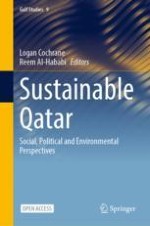Open Access 2023 | Open Access | Buch

Sustainable Qatar
Social, Political and Environmental Perspectives
herausgegeben von: Logan Cochrane, Reem Al-Hababi
Verlag: Springer Nature Singapore
Buchreihe : Gulf Studies
Open Access 2023 | Open Access | Buch

herausgegeben von: Logan Cochrane, Reem Al-Hababi
Verlag: Springer Nature Singapore
Buchreihe : Gulf Studies
This open access book provides a topical overview of the key sustainability issues in Qatar, focusing on environmental sustainability from a socio-political perspective. The transition to a sustainable Qatar requires engagement with diverse areas of social-political, human, and environmental development. On the environmental aspects, the contributors address climate change, food security, water reuse and desalination, energy, and biodiversity. The socio-political section examines state strategy and regulation, the place of environmental law and geopolitics and sustainability innovators and catalysts. The human section considers economics, sustainability education, the knowledge economy, and waste management. In doing so, the book demarcates the ways in which the country encounters and grapples with significant challenges and delves into the range of options for future pathways to sustainability in Qatar. Relevant to policymakers and scholars in energy and environment, urban and developmental studies, as well as the arenas of politics, climate change and policy, this book is a landmark collection on environmental policy in the Gulf and beyond.